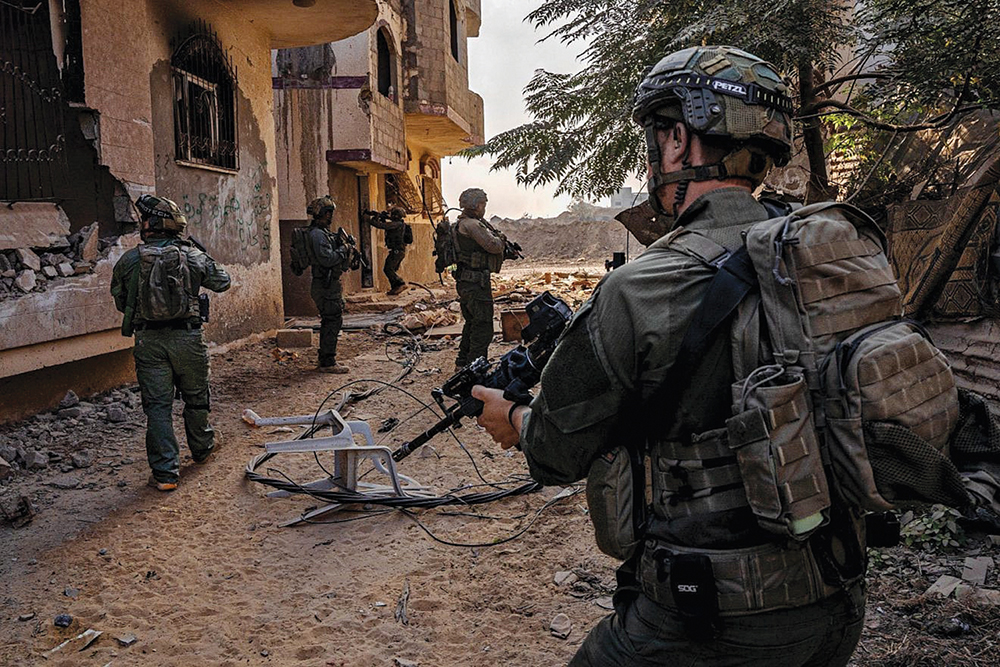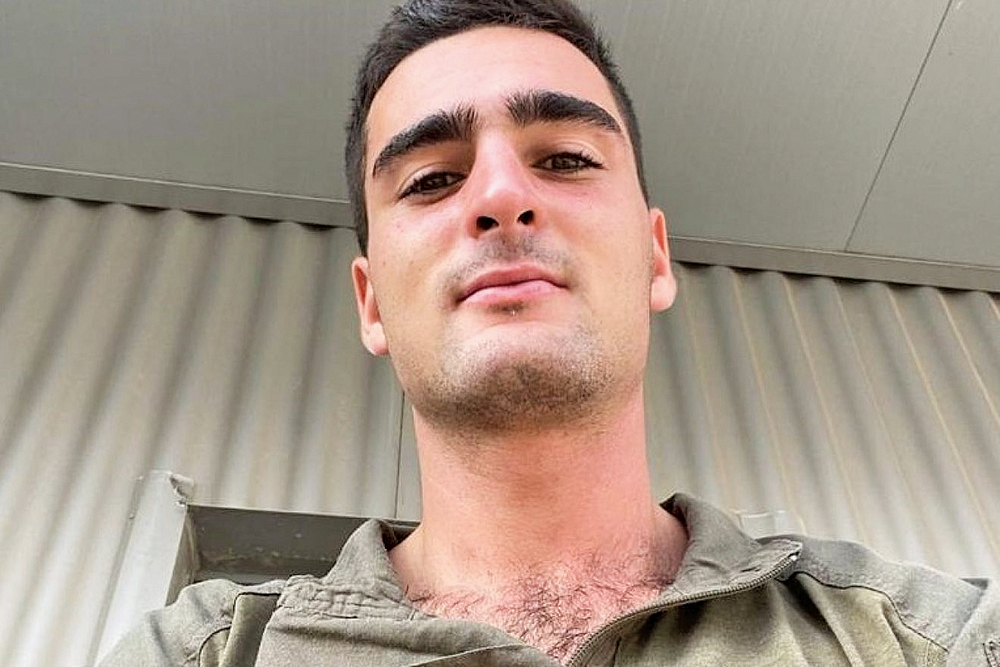
Sirens sounded in Israeli communities near Gaza on Wednesday morning, Jan. 3 as the IDF intensified its attacks on the Hamas stronghold of Khan Yunis in the southern Strip.
The Israeli Air Force struck terrorist targets in the center of the city overnight Tuesday, and attacks were also carried out in the Bureij, Nuseirat and Maghazi camps as well as in Rafah, according to Palestinian sources.
During Givati Brigade operations in Khan Yunis in recent days, terrorists who participated in the Oct. 7 mass murder in the northwestern Negev surrendered to Israel Defense Forces soldiers, the military said on Tuesday night.
Israeli soldiers in Gaza discovered a tunnel shaft located inside a school, the army said on Wednesday.
The tunnel was discovered by the 5th Brigade’s combat team in the southern Gaza town of Khuza’a (aka Khirbat Ikhzaa). The forces also found photos of weapons geared for children. A photo released by the IDF showed mortars, grenades and bullets inside the school.
During the military operation in Khuza’a, forces also raided Hamas observation posts and positions where terrorist squads fired anti-tank rockets.
Meanwhile, in Khan Yunis, ground forces directed an airstrike on a terrorist squad that was trying to attach a bomb to a tank. Soldiers also seized weapons and a safe containing hundreds of thousands of shekels inside the home of a member of Hamas’s Nukhba commando unit.
Also in Khan Yunis, an Israeli fighter jet struck a munitions production complex belonging to Palestinian Islamic Jihad.
In the Daraj Tuffah area of Gaza City, soldiers eliminated a terrorist squad operating aerial drones to observe the Israeli forces.
IDF Soldier Slain in Northern Gaza
The IDF released for publication on Wednesday that Sgt. First Class Meiron Moshe Gersch, 21, of the Combat Engineering Corps’ Yahalom unit, from Petah Tikva, was killed in action in northern Gaza on Tuesday.
Since the start of ground operations in the Gaza Strip on Oct. 27, 175 soldiers have been killed, and 509 in total since the war began on Oct. 7.

High Alert
The Israel Defense Forces is on a “very high state of alert in all arenas,” on defense and offense, and is prepared for any scenario, IDF Spokesman Rear Adm. Daniel Hagari stated on Tuesday night, soon after reports said Hamas deputy political bureau chief Saleh al-Arouri was killed in a blast in a Beirut apartment.
“The most important thing to say this evening is that we remain focused on fighting Hamas. In Gaza, our forces continue to fight, with a focus on Khan Yunis, over and underground, killing terrorists and destroying infrastructure,” said Hagari.
Earlier on Tuesday, Defense Minister Yoav Gallant said that the IDF has destroyed 12 Hamas battalions in the northern Gaza Strip, speaking during a visit to meet with Israeli forces there.
Speaking from the Salah al-Din Road in Gaza that is being used as a humanitarian evacuation corridor, Gallant indicated that the war will soon be shifting phases but is far from ending.
“You are on the corridor—the meaning of this is that from both sides of you will soon be actions of a different kind. From the north, we have destroyed 12 battalions of Hamas. It’s not that all the terrorists are dead, but the framework in which someone can lift binoculars, report back, mortars fall and then the [Hamas] commander sends a maneuvering force, it doesn’t exist. There are still terrorists on the order of a few thousand out of 15,000 or 18,000 that were in the sector,” said Gallant.
Going forward, this means that in northern Gaza, the IDF will focus on fire strikes, entering areas in a targeted manner and special operations. If necessary, he said, “we will hold for a period of time [when] we will decide in the field. But the goal is to exhaust the enemy, to kill him and to create a reality in which we control the territory.”
He added that Israel struck targets in Syria in response to an attack on the Golan Heights. Hagari urged Israeli civilians to remain attentive to Home Front Command instructions.
“We have not forgotten for a moment that one of the top national goals is the return of the hostages,” said Hagari.
‘There Is a Double Need for Victory’
In southern Gaza, the reality is very different, he stressed to the soldiers, noting that in Khan Younis and its environment, “we are conducting a cross-stage effort. It has nothing to do with the [multi-stage war] process. It is focused on what is above the tunnels in which senior Hamas figures are hiding, in great depths, and therefore, we are already reaching them in all ways and this is happening right now.”
The IDF’s changing actions are a reflection of the latest assessments, he said, noting that the impression that the war is coming to an end is unfounded.
“There is a double need for victory in the campaign: the first, to exact a price and ensure that those [Israelis] who live near the Gaza Strip can [continue to] do so. But more importantly—if you don’t end with a clear victory in an event where there are about 1,500 casualties and abductees, you cannot live in the Middle East because tomorrow someone else will come. Therefore, we are determined to achieve the goal,” Gallant vowed.
“The results will be clear results. We are finishing this campaign when Hamas no longer functions as a governing body and certainly not as a military framework that sends forces,” he told the troops.
In parallel to that, Israel is watching other threats, he said, “the first and most prominent of which is what is happening in the north. For this issue, we will start a process of preparation, and we are all the time with an eye in the binoculars and a finger on the trigger regarding what happens.”
Netanyahu: Hostage Release Talks Taking Place ‘Right Now’
Talks on the release of hostages held by Hamas in Gaza are taking place “right now,” Israeli Prime Minister Benjamin Netanyahu said on Tuesday night.
“The effort continues; the talks are taking place and have not been cut off,” Netanyahu stated following a meeting at the Kirya military headquarters in Tel Aviv with families of hostages held by Hamas, Islamic Jihad and other Gaza-based terrorist factions.
“There was an ultimatum from Hamas—now it has somewhat softened,” added the premier.
In a televised statement released earlier on Tuesday, Hamas leader Ismail Haniyeh warned that “enemy prisoners will not be released except under the resistance’s conditions.”
Hamas informed Qatari and Egyptian mediators it would only release hostages if Jerusalem agreed to a “complete cessation” of the Israel Defense Forces offensive in Gaza, Haniyeh said.
He also signaled his willingness to join a single Palestinian governing body for the Gaza Strip, Yehuda and Shomron once Israel wraps up its invasion in the coastal enclave.
Hamas is believed to still be holding approximately 129 hostages, although not all of them are thought to be alive. One hundred ten have been released, most in a deal that Hamas violated on Nov. 28.
Newly-installed Israeli Foreign Minister Israel Katz vowed on Tuesday to make the return of the hostages his ministry’s top priority.
Hours before Haniyeh’s speech, the London-based Arab World Press news outlet, citing sources inside Hamas, reported that the terrorist organization dropped its demand for an end to Israel’s military operation and the withdrawal of its troops.
Hamas is now open to the release of 40 hostages in return for 120 Palestinian terrorists held in Israeli prisons, the report said. Hamas had demanded a one-day ceasefire in exchange for each hostage, AWP said, but Jerusalem rejected that proposal.
“The five-way talks between Egypt, Qatar, the United States, Israel and Hamas are ongoing, but so far no agreement has been reached,” the source said, adding that negotiations have “accelerated significantly in recent hours,” with Cairo and Doha making “persistent efforts.”










